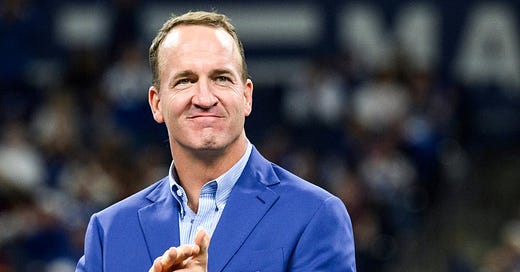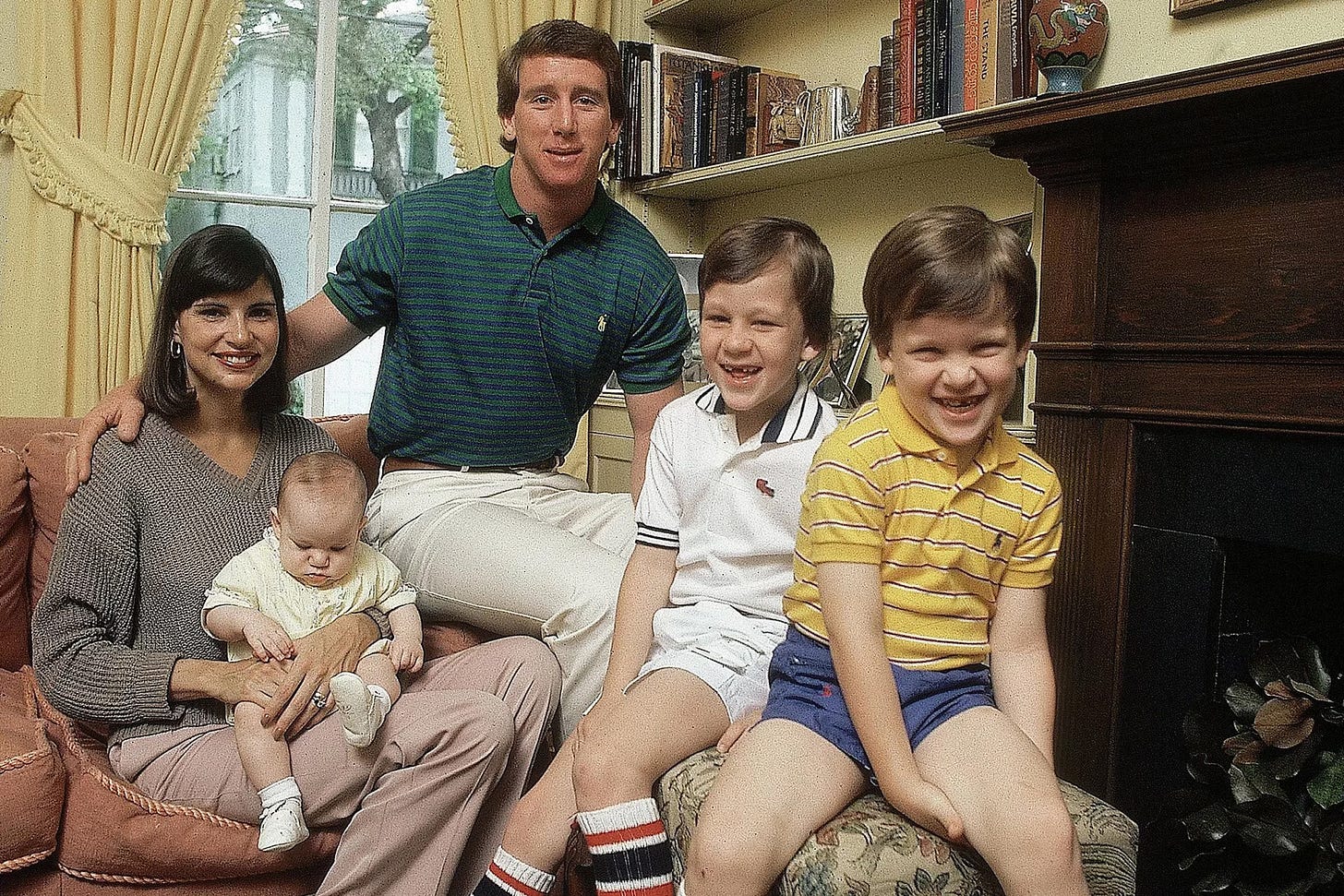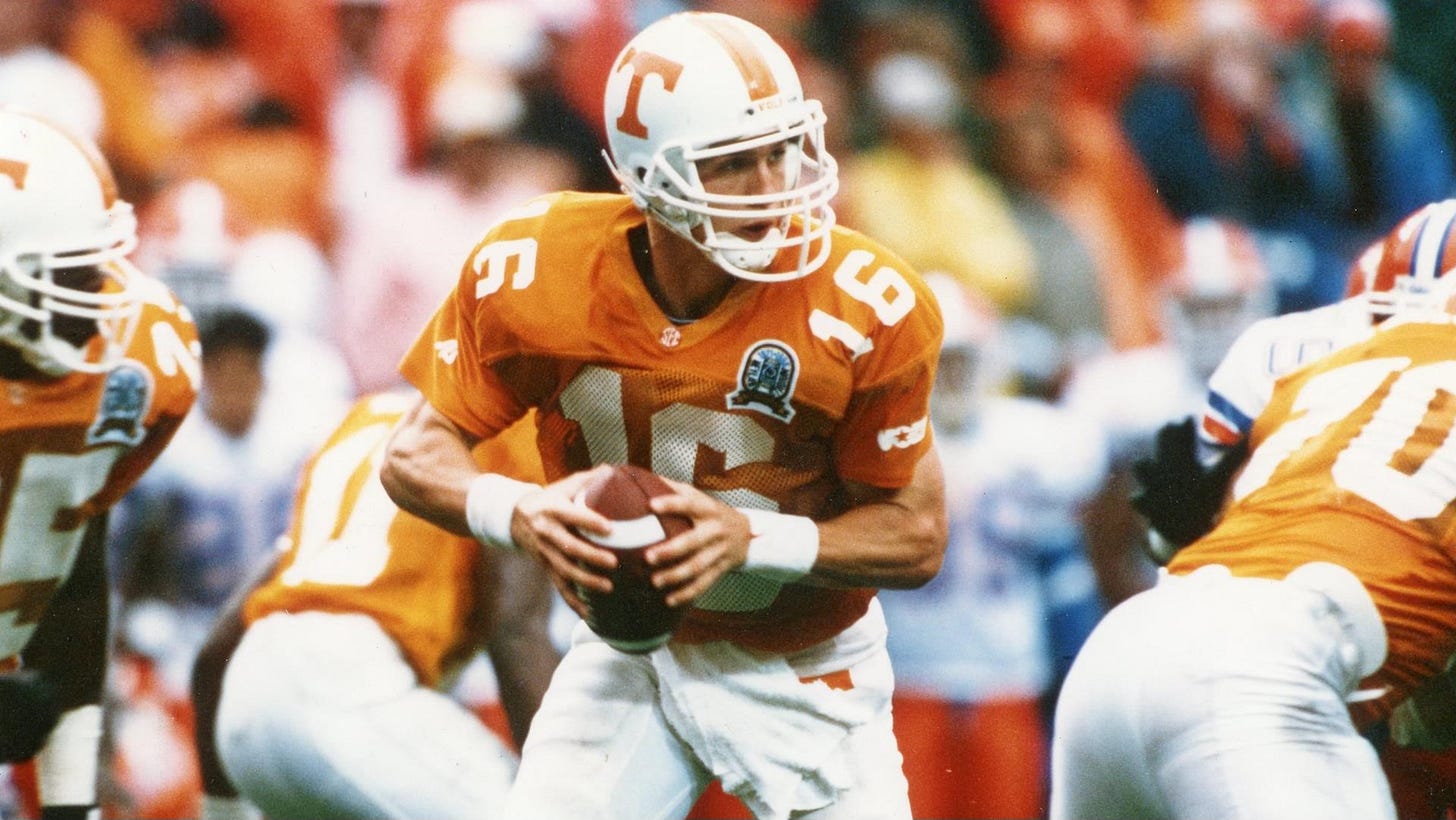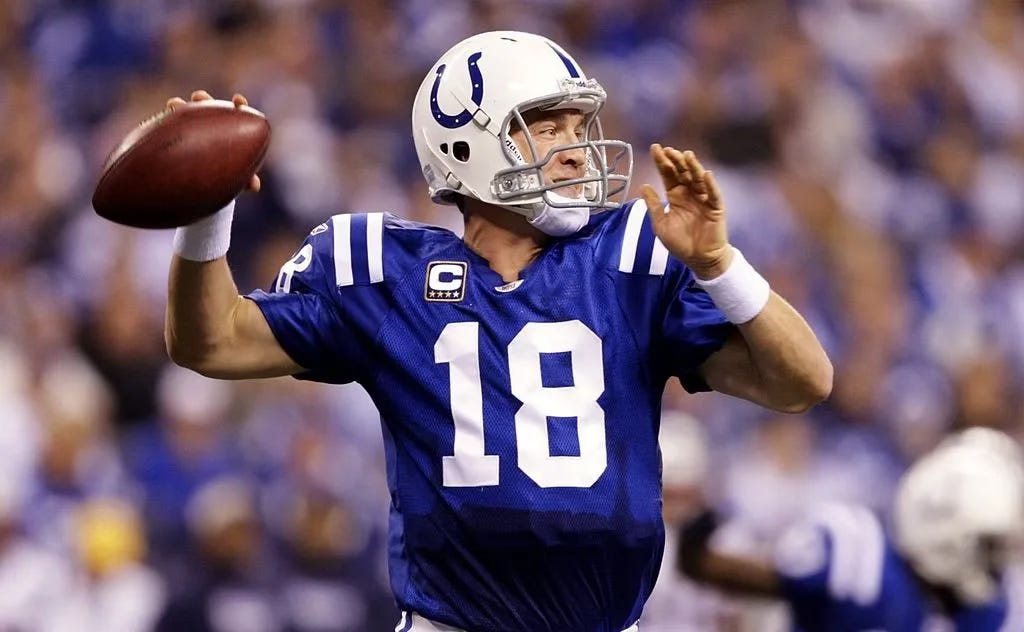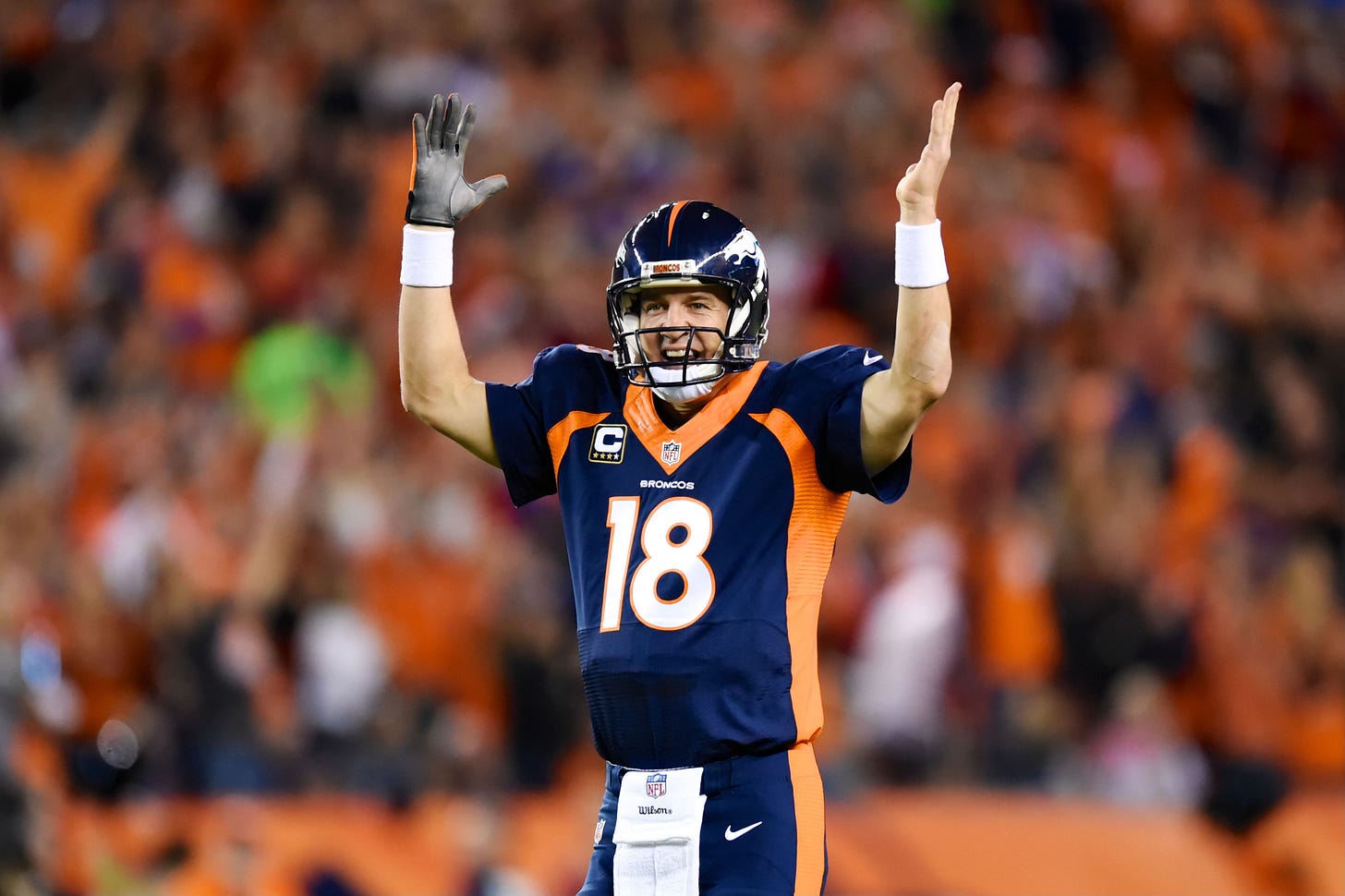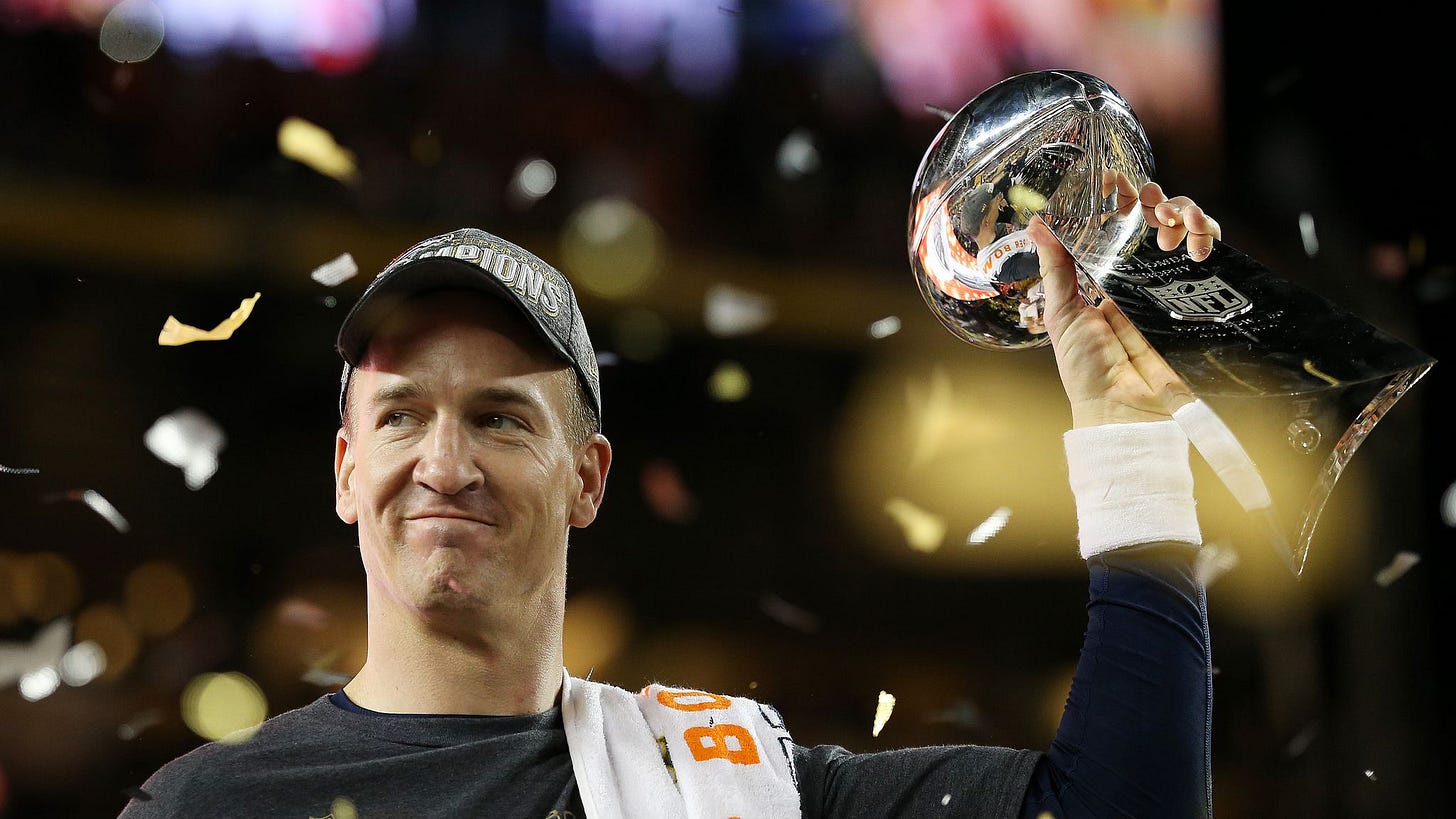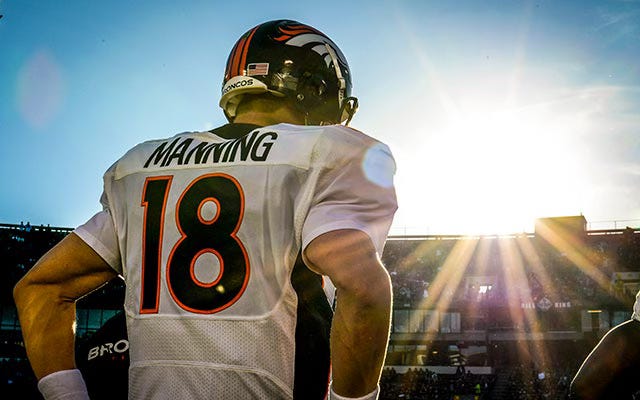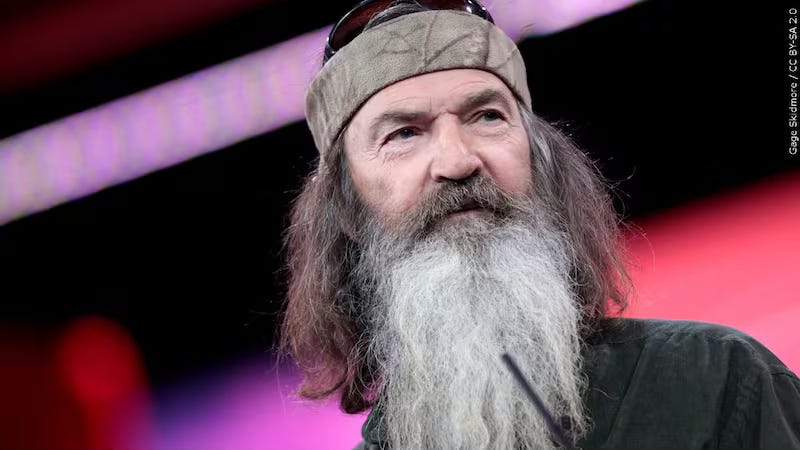Peyton Manning: Louisiana Roots, National Legacy, and the Making of an Enduring Icon
By The Bayou Insider Staff
There are few names in American sports more revered—or more universally respected—than Peyton Manning. A two-time Super Bowl champion, five-time NFL MVP, and one of the most cerebral quarterbacks ever to take the field, Manning’s place in football history is cemented among the all-time greats. His meticulous preparation, pinpoint accuracy, and natural leadership made him the gold standard at his position for nearly two decades.
To many, Peyton Manning is the ultimate professional—an icon of excellence whose legacy is built on records, rings, and relentless work ethic. But long before he was hoisting Lombardi trophies in Indianapolis or rewriting the record books in Denver—or even charming the country with his Southern wit and dry humor on television—he was simply a boy from New Orleans. A boy molded by Southern values, Sunday suppers, and the kind of quiet confidence that’s born in a place where family matters and tradition runs deep.
This isn’t just a sports story. It’s a Louisiana story. This is the story of how one of football’s greatest legends was shaped not just by his genes or ambition—but by a deep, enduring connection to the Bayou State that still pulses through everything he does.
Born Into Football Royalty
Peyton Manning entered the world on March 24, 1976, in New Orleans—a city celebrated more for jazz bands, gumbo pots, and Mardi Gras parades than for gridiron greatness. But behind the closed doors of a stately home in the Garden District, football was more than a game—it was a way of life. In the Manning household, it wasn’t just played. It was studied, lived, and deeply respected.
His father, Archie Manning, was already etched into Louisiana lore. As the gritty, gifted quarterback of the New Orleans Saints throughout the 1970s and early ’80s, Archie became a symbol of loyalty and perseverance. Though the Saints were often mired in losing seasons, Archie never turned his back on the team or the city. He and his wife Olivia chose to plant roots in New Orleans, raising their sons with a balance of Southern grace, athletic discipline, and an unwavering sense of integrity.
In that home, football wasn’t just a weekend ritual—it was part of the family DNA. Peyton and his brothers, Cooper and Eli, grew up throwing spirals in the backyard, breaking down game tape in the living room, and attending Saints games with the same reverence others reserved for church. Archie never pushed the game on his sons—but the love for it was contagious. It seeped into every conversation, every driveway scrimmage, every Sunday afternoon.
Peyton, the middle child, stood out early. Even as a kid, he carried himself with an unusual focus—quiet, observant, always studying. He wasn’t just trying to win games; he was trying to understand them. His intelligence, competitiveness, and uncanny poise began turning heads long before he ever put on pads for a varsity squad.
At Isidore Newman School, a prestigious private school in Uptown New Orleans, Peyton blossomed. Under the lights on Friday nights, he didn’t just perform—he commanded. By the time he graduated, he had thrown for over 7,000 yards and 90 touchdowns, leading the Greenies with surgical precision. But it wasn’t just the numbers. It was how he carried himself: the extra hours in the film room, the way he lifted his teammates, the rare combination of humility and hunger.
Coaches knew. Scouts knew. Louisiana knew. A star wasn’t just rising—it was being forged in the heart of New Orleans.
Choosing Tennessee: A Bold Move
When it came time for Peyton Manning to choose a college, the decision felt less like a sports headline and more like a Southern family saga. Most assumed the story was already written—he would follow in his father Archie’s footsteps and attend Ole Miss, donning the same red and blue that had defined the Manning name a generation earlier. It seemed like destiny.
But Peyton had other ideas.
LSU, the hometown powerhouse, made a strong push to keep him in Louisiana. So did Florida and Michigan—blue blood programs with national pedigrees and deep pockets. Yet in the end, it wasn’t tradition, pressure, or expectation that made the call. It was Peyton’s quiet resolve to carve his own path. In what many considered a shocking twist, he committed to the University of Tennessee.
The move sent ripples through the South. Rebel fans were stunned. Family friends were confused. Even some in Louisiana felt disappointed. But Peyton wasn’t chasing comfort or legacy—he was chasing growth. At Tennessee, he saw an opportunity to build something on his terms, to step out from under his father’s long shadow and earn his own place in college football history.
And that’s exactly what he did.
From the moment he took the field in Knoxville, Peyton brought a level of preparation and precision that turned the Volunteers into perennial contenders. He wasn’t flashy, but he was surgical. Coaches marveled at how he devoured playbooks, studied defenses, and raised the level of everyone around him. By the time he graduated, he held 42 NCAA, SEC, and school records. He had led Tennessee to an SEC Championship game, earned SEC Player of the Year honors, and finished as the runner-up for the Heisman Trophy.
But stats only tell part of the story.
More than the numbers, it was Peyton’s maturity and work ethic that left a lasting legacy in Knoxville. Teammates often recalled how he’d spend late nights studying film alone, how he’d write detailed scouting reports for his offense, how he treated walk-ons with the same respect he gave star receivers. He led not by speeches, but by showing up early and staying late.
In choosing Tennessee, Peyton Manning made a decision that proved something vital: greatness doesn’t come from living up to a legacy—it comes from building your own.
NFL Greatness: The Quarterback’s Quarterback
The 1998 NFL Draft was one of the most anticipated in recent memory—headlined by a classic quarterback debate: Peyton Manning or Ryan Leaf. The Indianapolis Colts held the No. 1 overall pick, and in what would soon prove to be a franchise-altering decision, they selected Manning. The choice wasn't just about talent. It was about leadership, character, and a mind built for the modern game.
Peyton entered the league with sky-high expectations—and was immediately humbled. His rookie season was a baptism by fire: 3–13 record, 28 interceptions, and more hits than highlights. But where others might have buckled, Peyton buckled down. He didn’t flinch. He studied harder. He watched more film. He worked relentlessly. Because failure didn’t scare Peyton—it focused him.
Over the next decade, he transformed the Colts from bottom-dwellers into a dynasty in the making. Year after year, Indianapolis was in the playoff hunt, thanks in large part to Manning’s unshakable consistency and football genius. He led the Colts to eight division titles, two Super Bowl appearances, and, finally, a long-awaited Super Bowl XLI victory in 2007 over the Chicago Bears—a moment that cemented his status as one of the all-time greats.
But Peyton wasn’t just winning. He was changing the very nature of the quarterback position.
His pre-snap routine became the stuff of legend—pointing, shouting audibles, dissecting defenses like a chess master mid-match. The now-iconic "Omaha!" became a symbol of his surgical style. Manning didn’t just run the offense—he was the offense. He read the field like a coordinator, often changing plays at the line and finding weaknesses in defenses before the ball was even snapped.
He was, as many coaches and players would later say, "a coach in cleats."
Then, in 2011, everything changed. A serious neck injury sidelined him for an entire season. Multiple surgeries cast doubt on his ability to ever throw again, let alone return to elite form. The Colts, preparing for life after Manning, released him.
It could’ve been the end.
Instead, it was the beginning of an extraordinary second act.
Manning signed with the Denver Broncos and promptly redefined what a comeback could look like. In Denver, he lit up the scoreboard, set records at a historic pace, and in 2013, delivered one of the greatest statistical seasons in NFL history—throwing 55 touchdowns and over 5,400 yards. Three years later, he capped his career with a second Super Bowl ring, this time with a dominant Broncos defense backing him.
He retired in 2016 as the all-time leader in numerous categories (many of which have only recently been surpassed). His final tally:
539 career touchdown passes
Over 71,000 passing yards
Five league MVP awards
Two Super Bowl victories
Fourteen Pro Bowl selections
But more than the numbers, Peyton Manning left the game with something far rarer: universal respect. Teammates loved him. Rivals admired him. Coaches trusted him. And fans—whether they wore Colts blue, Broncos orange, or Saints black and gold—cheered for him.
He was the quarterback’s quarterback. The gold standard. The field general who made excellence look effortless—and leadership look like second nature.
A Son of Louisiana, Still
Fame may have taken Peyton Manning across the country—from the stadiums of Indianapolis to the mile-high lights of Denver—but it never pulled him away from home. No matter how many awards he’s won or how large his national profile has grown, Peyton has remained deeply connected to his Louisiana roots. Not in loud declarations, but in quiet loyalty—the kind that doesn’t fade with time or distance.
He returns to New Orleans often, usually without fanfare. No press tours, no camera crews—just a hometown son checking in on family, supporting local causes, and staying involved in the life of the city that helped raise him. After Hurricane Katrina devastated the region in 2005, Peyton and the Manning family were quick to respond—not just with words, but with action. They donated time, money, and resources to schools, shelters, and rebuilding efforts across the city.
Over the years, Peyton has supported numerous Louisiana charities and educational initiatives, always careful to do so with humility and grace. To him, giving back to the state isn’t a headline—it’s a responsibility. A quiet thank you to the people and place that laid the foundation for his success.
But perhaps no act of service captures his love for Louisiana more than the Manning Passing Academy, held each summer at Nicholls State University in Thibodaux. There, under the scorching Louisiana sun, Peyton, Archie, and Eli gather with hundreds of high school quarterbacks from around the country for a week of coaching, teaching, and mentorship.
It’s not a photo op. It’s a proving ground.
Young players learn the fundamentals of quarterbacking—footwork, reads, timing—but they also receive something far more valuable: wisdom. Peyton teaches what it means to be a leader on and off the field. How to carry oneself. How to handle pressure. How to represent your community with integrity. The Mannings don’t just teach quarterbacks—they help shape young men.
The camp has become a rite of passage for many of today’s top quarterbacks. Alumni include names like Joe Burrow, Bryce Young, and Caleb Williams. Coaches, players, and parents alike speak of the experience with reverence—not just because of who runs it, but because of how they run it: with discipline, humor, and an unmistakable Louisiana charm.
For Peyton, it's more than a camp. It’s a way to pass on what Louisiana gave him—family, foundation, and a fierce love of the game.
The truth is, Louisiana didn’t get to cheer Peyton on in college. He never wore purple and gold, and his NFL teams called the Midwest and Rockies home. But in all the ways that matter, Louisiana never lost him. From Thibodaux to Uptown New Orleans, from postgame charity work to handwritten letters sent to young fans, the Bayou runs deep in Peyton’s veins.
He is, and always will be, a son of Louisiana.
Why He Endures
In an era where sports heroes often flicker like flashes in the pan—brilliant one moment, embroiled in scandal the next—Peyton Manning’s staying power stands out as something rare and refreshing. His appeal isn’t built on theatrics or controversy. It’s built on something far more durable: authenticity.
Peyton has never needed to pretend. Whether he’s breaking down complex defensive schemes or poking fun at himself in a commercial for insurance or chicken parm sandwiches, he’s always leaned into who he really is—smart, Southern, slightly awkward, fiercely competitive, and deeply grounded. There’s no manufactured persona. What you see is what you get. And what you get is a man who’s as comfortable drawing up plays on a whiteboard as he is hosting Saturday Night Live in a pair of slacks and cowboy boots.
His wit and self-deprecating humor have become part of his brand—but never in a way that feels forced. From his legendary United Way spoof on SNL to his many ads that wink at his obsessive game prep, Peyton has always shown that greatness and humility can coexist. He’s in on the joke, because he never thought he was above it.
That sense of groundedness came into full view with the launch of ManningCast on ESPN, a Monday Night Football alternate broadcast he co-hosts with his younger brother Eli. What could’ve been a stiff analytical show instead became a cultural phenomenon. Watching the two brothers banter, argue over plays, and gently roast each other felt less like a TV segment and more like being in someone’s living room.
It wasn’t just football—it was family.
It wasn’t just analysis—it was authenticity.
Viewers from all walks of life—diehard fans, casual observers, even people who barely follow football—tuned in not just for insight, but for a feeling. The feeling that, in a sports world filled with noise and ego, here were two guys who genuinely loved the game, each other, and the moment.
And through it all, Peyton has never veered from the core values that shaped him. He’s respected the game. He’s respected his teammates. He’s respected the people who cheer from the stands. He’s never demanded the spotlight, but he’s never shrunk from responsibility either. That balance of humility and leadership is what makes him more than just a legend—it makes him beloved.
In an age where character often takes a back seat to clicks, Peyton Manning quietly reminds us that excellence doesn’t have to come at the cost of decency. That humor and heart can elevate greatness. And that sometimes, being real is the most powerful legacy of all.
A Southern Gentleman, A National Icon
What makes Peyton Manning so compelling isn't just the mountain of records he broke or the trophies he hoisted—it's who he's always been when the cameras stopped rolling. Long before he became a face of the NFL, Peyton was a son of the South. And it shows. The way he carries himself—measured, respectful, genuine—isn’t something he picked up from a PR team. It’s something he inherited from a long line of Southern values: faith, family, humility, and hard work.
Those values, instilled in him during his upbringing in New Orleans, became the quiet force behind everything he achieved. He didn’t chase attention, yet he became the center of it. He didn’t demand respect, but earned it from teammates, opponents, and fans alike. Whether giving postgame interviews, leading his offense down the field, or sending handwritten thank-you notes (which he still does), Peyton has always moved with intentionality and grace—like a man raised to believe that success without gratitude isn’t success at all.
In a modern sports world often clouded by controversy, branding wars, and self-promotion, Peyton’s reputation has remained remarkably untarnished. No scandals. No arrogance. No off-field drama. Just steady, quiet excellence paired with an almost old-fashioned sense of honor. He wasn’t trying to build a brand—he was just being himself. And that turned out to be the most powerful brand of all.
He’s the kind of figure who transcends rivalry. Colts fans love him. Broncos fans revere him. Even Saints fans—who never got to claim him professionally—smile when his name is mentioned. Across red states and blue states, locker rooms and living rooms, Peyton Manning represents something that feels increasingly rare in American life: consistency. Character. Class.
And through it all, he’s never forgotten where he came from.
His speeches still reference his roots. His charitable efforts still uplift Louisiana causes. His family remains his greatest pride. And his interactions with fans, no matter how famous he becomes, still carry the humility of a man who knows he didn’t get here alone.
Peyton Manning isn’t just a football legend. He’s the rare public figure who reminds us that fame and decency can walk hand in hand, and that the lessons learned in a Louisiana backyard can carry a man all the way to the Hall of Fame.
Conclusion: The Legacy of #18 Lives On
Peyton Manning is more than just a football legend. He’s more than a record book staple, more than a two-time Super Bowl champion, and more than one of the most cerebral athletes the game has ever known. He’s a product of Louisiana—a state defined by its deep roots, its resilient spirit, and its unwavering sense of identity.
From the tree-lined streets of the Garden District to the roaring stadiums of the NFL, Peyton’s journey has always echoed the quiet strength and pride of his upbringing. His story is a testament to what this state can produce when family, faith, and fundamentals come together: a man who never had to choose between greatness and goodness. A man who embodies both.
In every audible called at the line of scrimmage, in every pass thrown with surgical precision, and in every postgame interview filled with humility and class, Louisiana lives in Peyton Manning. You can hear it in his voice. You can see it in the way he treats people. You can feel it in the way he carries the weight of fame without ever losing sight of who he is—or where he came from.
His legacy isn’t just measured in touchdowns and trophies. It’s measured in the countless young athletes he’s mentored at the Manning Passing Academy. In the families he’s helped in post-Katrina recovery efforts. In the thousands of fans who see in him something enduring: proof that character still matters. That work ethic still pays off. And that you can rise to the top without losing the heart of where you started.
So while his jersey may hang in the rafters of Denver and Indianapolis, his story begins—and forever belongs—in Louisiana.
Because in the end, no matter how far his fame has stretched or how high his star has risen, Peyton Manning will always be a son of the South. A child of New Orleans. A legend of the Bayou.
And his legacy? It lives on—in the state that shaped him, and in the hearts of all who still proudly claim him as one of their own.
Call to Action
Have your own Peyton Manning story? Were you coached at the Manning Passing Academy, stood in line for an autograph in Thibodaux, or watched his early games at Isidore Newman? Maybe you’ve met him at a charity event, bumped into him in New Orleans, or simply admired his character from afar.
We want to hear from you.
At The Bayou Insider, we believe the legends of Louisiana are not just written in headlines—they’re lived in everyday moments, shared memories, and hometown pride. As we celebrate Peyton Manning’s legacy as a son of the South and one of football’s finest, we invite you to share your personal stories, photos, or reflections about how Peyton impacted your life, inspired your family, or represented our great state on the national stage.
Your voice is part of Louisiana’s story—and his.
Send your stories to us at [insert email] or drop them in the comments section of this article. Selected submissions may be featured in an upcoming Bayou Insider reader spotlight as we continue honoring the people and moments that make Louisiana proud.
Let’s celebrate our legends together.
Phil Robertson: The Bayou's Bearded Patriarch Leaves a Legacy of Faith, Family, and Freedom
By The Bayou Insider Staff

